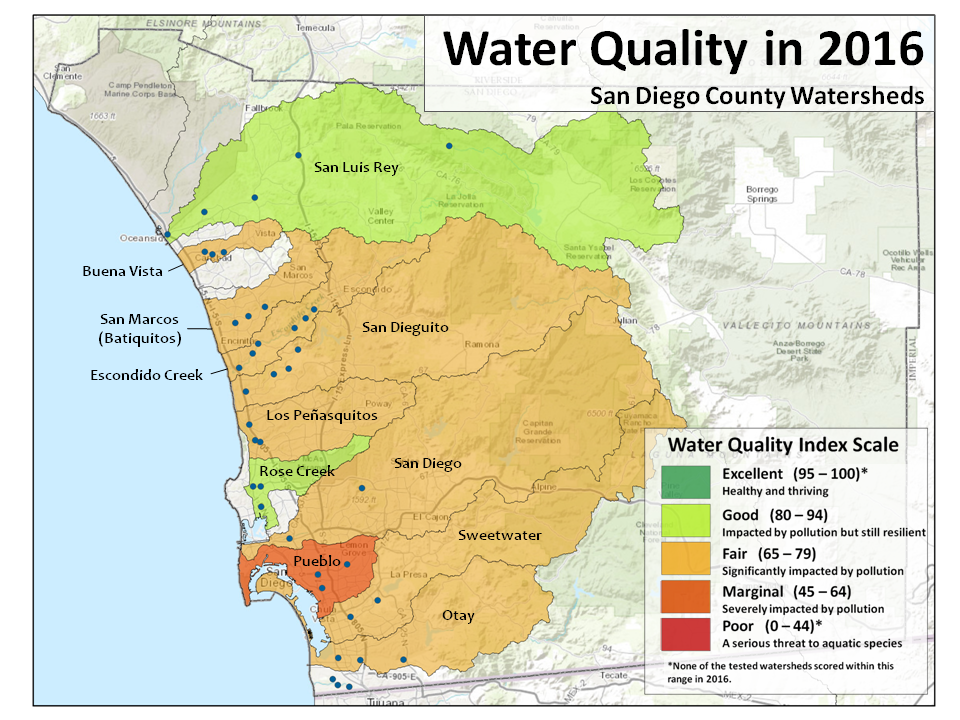
For the first time since 2013, San Diego Coastkeeper’s data show an overall improvement in San Diego’s water quality.
“This is great news. Of course, a single year of overall better water quality readings does not mean San Diego’s water will keep improving. It takes many years for patterns to emerge,” says San Diego Coastkeeper Lab Manager Meredith Meyers. “That’s why our long-term water monitoring is so crucial. We can provide decision-makers with the big picture and that makes for more effective, data-based policy.”
Urban runoff continues to be the largest factor impacting people’s ability to safely fish and swim in San Diego County. Rain takes pollution from the surfaces of our streets into our storm drains, where it travels through to our rivers and streams and ultimately, to the Pacific Ocean. As a result, the overwhelming majority of San Diego’s waterways fail to the meet water quality standards that make them safe for recreation.
Though the cause of last year’s improved results can’t be directly identified, and Coastkeeper scientists caution against giving too much credit to any one theory, there are a few ideas about why water quality looked a little better in 2016.
“Temporary water conservation regulations, implemented in response to the drought, may have helped water quality improve. When San Diegans prioritize conservation over lush lawns, reduced fertilizer use and fewer lawn sprinklers overflowing onto sidewalks means less pollution washing from the street into our rivers and streams,” says Meyers. “It’s impossible to know for sure, but it’s one idea that makes sense.”
San Diego Coastkeeper collects monthly water quality data from across the County through its volunteer-powered Water Quality Monitoring program. The program, which is the largest of its kind in California, trains citizen scientists to collect vital water quality data to fill gaps and increase the amount of publically available data.. In 2016, 152 trained volunteers gave a collective 1,908 hours.
“Our Water Quality Monitors are more dedicated than ever. Participation was so consistent last year we were able to reduce the number of new volunteers we needed to bring on board to maintain the program,” says Meyers. “The dedication of our trained monitors has allowed us to put even more resources straight into the monitoring itself, and has improved the program as a whole.”
The organization uses a suite of indicators to calculate an overall 2016 Water Quality Score for different watersheds across San Diego County. For the first time since 2013, some of San Diego County’s watersheds surpassed the “Fair” rating on the Water Quality Index,” reaching “Good.”
San Luis Rey – 82 Good
Buena Vista – 78 Fair
San Marcos (Batiquitos) – 79 Fair
Escondido Creek – 72 Fair
Peñasquitos – 76 Fair
Rose Creek – 87 Good
San Dieguito – 78 Fair
San Diego – 72 Fair
Pueblo – 56 Marginal
Sweetwater – 74 Fair (20 percent improvement from 2015)
Otay – 70 Fair
Tijuana – N/A (unsafe to test because of sewage contamination)
“Every year, our results continue to show that water quality is defined by all of us. There’s no single source of pollution poisoning our environment; it’s all of our daily actions that determine our water quality,” says Meyers. “Whenever you pick up a piece of litter, fix a leaky sprinkler or forgo chemical fertilizers in your garden, you make a real impact. We all have the opportunity to take small actions that matter.”
After each month’s water sampling, San Diego Coastkeeper updates its online, color-coded water quality map.
Read the full water quality report for 2016.
As a trained Water Quality Monitor, volunteers can learn how to generate vital, scientifically sound data to better inform decision-makers and the public. Visit San Diego Coastkeeper’s website to learn more, sign up for training, to view the 2017 water quality-monitoring schedule and to donate to help the organization continue doing this important work.

Communications Consultant Lola Dvorak supports CCKA’s strategic communications by helping waterkeepers tell their stories.



